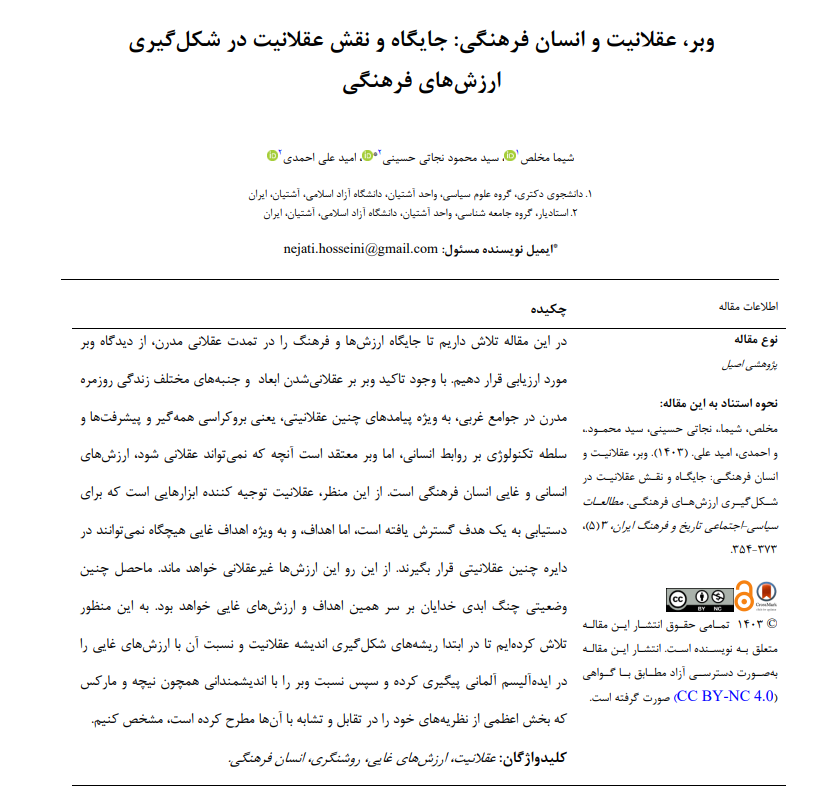وبر، عقلانیت و انسان فرهنگی: جایگاه و نقش عقلانیت در شکلگیری ارزشهای فرهنگی
کلمات کلیدی:
عقلانیت, ارزش¬های غایی, روشنگری, انسان فرهنگیچکیده
در این مقاله تلاش داریم تا جایگاه ارزشها و فرهنگ را در تمدت عقلانی مدرن، از دیدگاه وبر مورد ارزیابی قرار دهیم. با وجود تاکید وبر بر عقلانیشدن ابعاد و جنبههای مختلف زندگی روزمره مدرن در جوامع غربی، به ویژه پیامدهای چنین عقلانیتی، یعنی بروکراسی همهگیر و پیشرفتها و سلطه تکنولوژی بر روابط انسانی، اما وبر معتقد است آنچه که نمیتواند عقلانی شود، ارزشهای انسانی و غایی انسان فرهنگی است. از این منظر، عقلانیت توجیه کننده ابزارهایی است که برای دستیابی به یک هدف گسترش یافته است، اما اهداف، و به ویژه اهداف غایی هیچگاه نمیتوانند در دایره چنین عقلانیتی قرار بگیرند. از این رو این ارزشها غیرعقلانی خواهد ماند. ماحصل چنین وضعیتی چنگ ابدی خدایان بر سر همین اهداف و ارزشهای غایی خواهد بود. به این منظور تلاش کردهایم تا در ابتدا ریشههای شکلگیری اندیشه عقلانیت و نسبت آن با ارزشهای غایی را در ایدهآلیسم آلمانی پیگیری کرده و سپس نسبت وبر را با اندیشمندانی همچون نیچه و مارکس که بخش اعظمی از نظریههای خود را در تقابل و تشابه با آنها مطرح کرده است، مشخص کنیم.
دانلودها
مراجع
Adair‐Toteff, C. (2022). Why Rickert? Regarding the dogma about Heinrich Rickert's influence on Max Weber. Journal for the Theory of Social Behaviour. https://doi.org/10.1111/jtsb.12344
Bowden, B. G. (2019). Empiricism, epistemology and modern postmodernism: a critique. Qualitative Research in Organizations and Management: An International Journal. https://doi.org/10.1108/QROM-02-2019-1726
Brown, W. (2023). Nihilistic Times: Thinking with Max Weber (Vol. 9). Harvard University Press. https://doi.org/10.2307/jj.608343 10.4159/9780674293274
Gramsci, A. (1975). History, philosophy and culture in the young Gramsci. Telos Press, Limited.
Horii, M. (2019). Historicizing the category of "religion" in sociological theories: Max Weber and Emile Durkheim. Critical Research on Religion, 7(1), 24-37. https://doi.org/10.1177/2050303218800369
Kalberg, S. (1980). Max Weber's types of rationality. American Journal of Sociology, 85(5), 1145-1179. https://doi.org/10.1086/227128
Kinzel, K. (2021). Historical thought in German neo-Kantianism. British Journal for the History of Philosophy, 29(4), 579-589. https://doi.org/10.1080/09608788.2021.1932411
Kozer, L. (2013). The Life and Thought of Great Sociologists (18th ed.). Scientific Publications.
Lim, K. P., Marshall, H., Tammemägi, M., Brims, F., McWilliams, A., Stone, E., & Lam, S. (2020). Protocol and rationale for the international lung screening trial. Annals of the American Thoracic Society, 17(4), 503-512. https://doi.org/10.1513/AnnalsATS.201902-102OC
Morley, L. (2022). Social work, Max Weber and ethical irrationality. The British Journal of Social Work, 52(6), 3114-3129. https://doi.org/10.1093/bjsw/bcab225
Morrissette, J. (2017). Glory to Arstotzka: Morality, rationality, and the iron cage of bureaucracy in Papers, Please. Game Studies, 17(1).
Pezzutto, S. (2019). Confucianism and capitalist development: from Max Weber and orientalism to Lee Kuan Yew and new Confucianism. Asian Studies Review, 43(2), 224-238. https://doi.org/10.1080/10357823.2019.1590685
Rehmann, J. (2014). Max Weber: Modernisation as Passive Revolution: A Gramscian Analysis. Brill. https://doi.org/10.1163/9789004280991
Reisach, U. (2021). The responsibility of social media in times of societal and political manipulation. European Journal of Operational Research, 291(3), 906-917. https://doi.org/10.1016/j.ejor.2020.09.020
Rickert, H. (1986). The limits of concept formation in natural science: A logical introduction to the historical sciences (abridged edition). CUP Archive.
Schluchter, W. (1985). The rise of Western rationalism: Max Weber's developmental history. University of California Press.
Speirs, R. C. (1989). Ernst Troeltsch: The Revolution in Science. In Max Weber's 'Science as a Vocation' (pp. 58-69). Routledge. https://doi.org/10.4324/9781003420521-6
Tugendhat, E. (1984). Probleme der Ethik. Stuttgart: Reclam.
Turner, B. (1996). For Max Weber: Essays on the Sociology of Fate (2nd ed.). Sage, London.
Warren, M. (1994). Nietzsche and Weber: When Does Reason Become Power? In A. Horowitz & T. Maley (Eds.), The Barbarism of Reason: Max Weber and the Twilight of the Enlightenment. University of Toronto Press. https://doi.org/10.3138/9781442671188-005
Weber, M. (1949). The Methodology of the Social Sciences. The Free Press.
Weber, M. (1975). Max Weber: A Biography. Translated by H. Zohn.
Weber, M. (1978a). Anticritical Last Word on The Spirit of Capitalism. Translated by W. M. Davis, 83, 1110-1130. https://doi.org/10.1086/226676
Weber, M. (1978b). Economy and Society (2 vols ed.). University of California Press.
Weber, M. (1989). The National State and Economic Policy (Inaugural Lecture, Freiburg, May 1895). In K. Tribe (Ed.), Translated by B. Fowkes. Routledge.
Weber, M. (1994a). The Protestant Ethic and the Spirit of Capitalism. Translated by Morteza Saffarbakhsh.
Weber, M. (1994b). Weber: Political Writings. Cambridge University Press. https://doi.org/10.1017/CBO9780511841095
Zagirnyak, M. (2023). Kant's anti-naturalism: The foundations of sociability in Max Weber and Sergey Hessen. SHS Web of Conferences,








